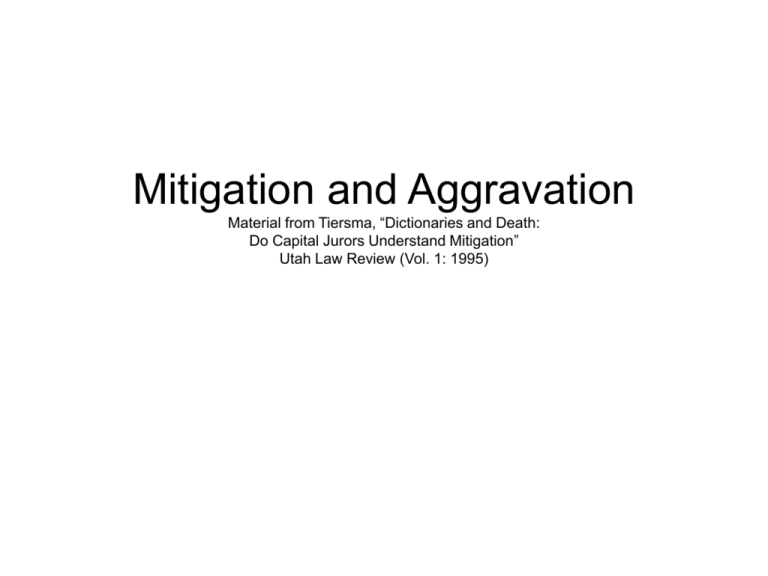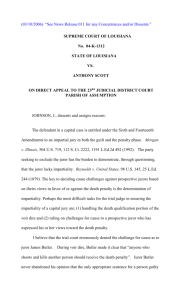Mitigating
advertisement

Mitigation and Aggravation Material from Tiersma, “Dictionaries and Death: Do Capital Jurors Understand Mitigation” Utah Law Review (Vol. 1: 1995) Why mitigation? • According to 8th amendment capital sentence may not be imposed arbitrarily or capriciously • (There may be a bias by some jurors, contrary to the law, that because someone has taken the life of another, that person deserves the death penalty.) • Consequently, the jury must be given guidance regarding the factors surrounding the crime and the defendant. A defendant must be free to present any mitigating evidence relevant to his/her background or to the circumstances of the crime. Aggravation vs. Mitigation • "aggravating circumstances" – reasons that the defendant should be put to death • "mitigating circumstances" – reasons that his life should be spared and instead be sentenced to life imprisonment. 1989 Calif. Instruction A mitigating circumstance is: “any fact, condition or event, which as such, does not constitute a justification or excuse for the crime in question, but may be considered as an extenuating circumstance in determining the appropriateness of the death penalty.” Problem: Jury Comprehension • One court gave the following definition (from Black’s Law Dictionary) when the jury asked for definitions: “Aggravation. Any circumstance attending the commission of a crime which increases its guilt or enormity or adds to its injurious consequences, but which is above and beyond the essential constituents of the crime itself… “Mitigating: Circumstances such as do not constitute a justification of excuse of the offense in question, but which, in fairness and mercy, may be considered as extenuating or reducing the degree of moral culpability.” A former juror stated: “A number of years ago, I served in a state court where the Judge instructed us in language none of us understood. It was involved and tedious and long, and so full of ‘whereases’ and ‘therewiths’ that he lost us halfway through… We all agreed, and we proceeded to consider the case according to our rough sense of justice without much regard for the law.” Why is there a problem? • Mitigation – an uncommon term outside the law • Aggravation – has an ordinary meaning different from the legal one. – ordinary meaning: ‘annoying’; legal meaning ‘worsening’ • One study (by L. Sontag) showed that one-half of juries (in post questioning) reported asking the trial judge to define these crucial terms. • One juror stated: “The first thing we asked for after the instructions was, could the judge define mitigating and aggravating circum-stances…I said, ‘I don’t know that I exactly understand what it means. And then everybody else said, ‘No, neither do I,’ or ‘I can’t give you a definition’. So we decided we should ask the judge. Well, the judge wrote back and said, ‘You have to glean it from the instructions.’” The Zeisel Survey (1966) Here is an instruction: “If, from your consideration of the evidence and after due deliberation, there is at least one of you who finds that there is at least one mitigating factor sufficient to preclude the imposition of the death sentence then you should return a verdict that the defendant should be sentenced to imprisonment. On the other hand, if from your consideration of the evidence after due deliberation you unanimously find that there are no mitigating factors sufficient to preclude the imposition of the death sentence then you should return a verdict that the Defendant be sentenced to death. Question 4: A juror decides that the fact that Mr. Woods was only 25 years of age when he committed the murder is a mitigating factor sufficient to preclude the death penalty. However the other 11 jurors disagree and insist that his age is not a mitigating factor. The one juror believes that she cannot consider a mitigating factor unless the entire jury agrees upon it and votes for the death penalty. She votes for the death penalty. Has that juror followed the judge’s instructions? • Yes( ) No ( ) Do not know ( ) Queston 5: • A juror decides that the fact that Mr. Woods was good to his family is a mitigating factor sufficient to preclude the death penalty. However, the other eleven jurors disagree. The other jurors insist that no juror should consider the defendant’s good relations with his family as a mitigating factor unless they all agree it is a mitigating factor. The one juror accepts this approach and votes for the death penalty. Has that juror followed the judge’s instructions? • Yes( ) No ( ) Do not know ( ) • Question: Do jurors have to be unanimous in deciding that there is a mitigating factor, and if so must they be unanimous in what that factor is? • No. A single juror can decide that some aspect of the defendant’s character is a mitigating factor and that is sufficient to justify not sentencing the defendant to death. Here is another instruction: “Mitigating factors include but are not limited to the following circumstances. One, the Defendant has no significant history of prior criminal activity. Two, the murder was committed while the Defendant was under the influence of extreme mental or emotional disturbance, although not such as to constitute a defense to prosecution. If, from your consideration of the evidence, you find that any of the above mitigating factors are present in this case, or that any other mitigating factors are present in this case then you should consider such factors in light of any existing aggravating factors in determining whether the death sentence shall be imposed.” Question 7: • A juror decides that the fact the Mr. Woods did not kill more than one person is a reason sufficient not to sentence him to death. However, she also concludes that this fact is not one of the mitigating factors which the judge specifically mentioned. She also does not believe this fact provides a reason to spare the defendant’s life that is comparable to any with the mitigating factors that the judge specifically mentioned. She concludes that as a result she must vote for the death penalty, and does so. Has that juror followed the judge’s instructions? • Yes( ) No ( ) Do not know ( ) Question: Where there is a list of types of mitigating factors, if a juror thinks there is a mitigating circumstance, must it come from that list? No. A juror can find any factor relevant.





